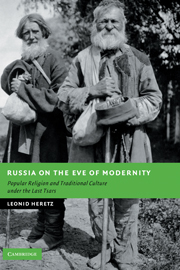Book contents
- Frontmatter
- Contents
- Acknowledgments
- Introduction
- 1 The traditional worldview
- 2 The Old Believers: modernization as apocalypse
- 3 The sectarians: dualism and secret history
- 4 Folk eschatology
- 5 The assassination of Alexander II (1881) and folk Tsarism
- 6 The year of famine and cholera (1891–1892): demonization of the nobility
- 7 The Japanese War: peasant Russia and the wider world
- 8 1905: revolution or reaction?
- 9 The Great War and the crisis of the traditional culture
- Epilogue
- Bibliography
- Index
- NEW STUDIES IN EUROPEAN HISTORY
4 - Folk eschatology
Published online by Cambridge University Press: 23 December 2009
- Frontmatter
- Contents
- Acknowledgments
- Introduction
- 1 The traditional worldview
- 2 The Old Believers: modernization as apocalypse
- 3 The sectarians: dualism and secret history
- 4 Folk eschatology
- 5 The assassination of Alexander II (1881) and folk Tsarism
- 6 The year of famine and cholera (1891–1892): demonization of the nobility
- 7 The Japanese War: peasant Russia and the wider world
- 8 1905: revolution or reaction?
- 9 The Great War and the crisis of the traditional culture
- Epilogue
- Bibliography
- Index
- NEW STUDIES IN EUROPEAN HISTORY
Summary
Earlier, an outline of what might be called the “static” aspect of the traditional worldview was presented showing popular conceptions of the nature and mundane functioning of the world. This chapter will attempt to add movement to the picture by presenting folk perceptions of the character and direction of fundamental change, in other words, it will try to recreate the traditional Russian understanding of history. In a culture formed by Christianity, the only possible model for history was of course eschatology, through which events are interpreted in light of the anticipated cataclysmic end of the present world. In a pattern which should be familiar by now, Orthodoxy set the parameters for popular historic conceptions, while the apocryphal legacy filled out the details. An analysis of expressions of folk apocalyptic thinking in the late nineteenth and early twentieth centuries will allow for the development and elucidation of themes already presented in this work, and at the same time offer valuable insights into the state of mind of the Russian peasantry in the last years of the Imperial regime.
“OFFICIAL” ESCHATOLOGY
Russian folk eschatology was built on the stark and simple foundation of the Christian teaching of the Second Coming and the Last Judgment (or, in the Orthodox usage, “Dread Judgment”). The notion of Judgment was conveyed in the Creed (the relevant Slavonic phrase – suditi zhivim i mertvym – being readily intelligible), sung at every liturgy and read during each service, and in the supplication for a “good response at the dread judgment seat of Christ” (dobrago otveta na strashnem sudishchi Khristove), repeated several times in all services.
- Type
- Chapter
- Information
- Russia on the Eve of ModernityPopular Religion and Traditional Culture under the Last Tsars, pp. 102 - 118Publisher: Cambridge University PressPrint publication year: 2008



